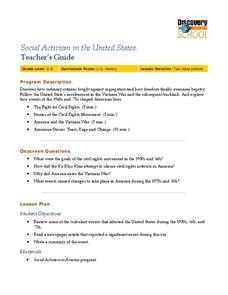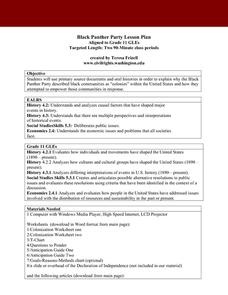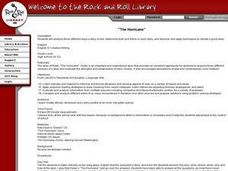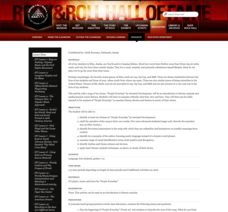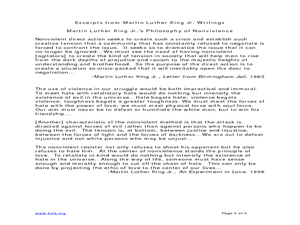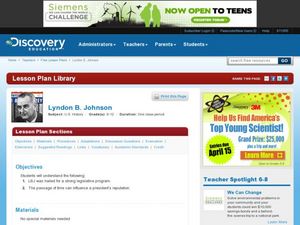Learning for Justice
Mary Church Terrell
Excerpts from an 1898 speech by civil rights activist Mary Church Terrell offers young scholars an opportunity to investigate how Black American women fought for civil rights long before Rosa Parks and the civil rights movement of the...
National Endowment for the Humanities
"Sí, se puede!": Chávez, Huerta, and the UFW
"Sí, se puede!" Cesar Chavez and Dolores Huerta believed organizing farm workers and changing their working conditions were possible. Scholars examine provisions of the Bracero Program, videos, and the United Farm Workers' (UFW) work....
National Woman's History Museum
Gloria Steinem, Feminism and “Living the Revolution"
Excerpts from Feminine Mystique by Betty Friedan and from Gloria Steinem's "Living the Revolution" provide high schoolers an opportunity to study the feminism of the 1950s and 1960s, sometimes called the "Second Wave of Feminism."
National Endowment for the Humanities
Revolution '67, Lesson 1: Protest: Why and How
To some people, protesting is as American as apple pie, but the factors that lead to protests can be as confusing to veteran activists as to today's youth. Revolution '67 explores the riots in Newark, New Jersey as a case study. Using...
Curated OER
Romantic and 20th Century Period Music
Upper graders explore the similarities, differences, and depth of pop music from the Romantic era and the 20th century. They listen to selections that exemplify the Baroque, Romantic, and 20th century periods, then create presentations...
Curated OER
Active Citizenship: The Civil Rights Work of Bob Moses
Students discuss and describe the impact of Bob Moses as an activist, compare and contrast the work of Bob Moses in the 1960's and today and develop an action plan regarding an issue they feel strongly about.
Curated OER
Rosa Parks and the Montgomery Bus Boycott
Students dramatize incident that started the civil rights movement of the 1950s and 1960s: Rosa Parks's refusal to give up her seat on a bus in Montgomery, Alabama.
Curated OER
Living History
Students write an essay and interview someone who remembers the 1960's and 1970's. In this history lesson plan, students write their essays as if they were there in that time period, write their feelings, and put together a mini museum...
Curated OER
A Soldier's Letters
Students explore the role letters play in a soldier's life and learn background information about Vietnam in the 1960s.
Curated OER
Fallen Angels
Students read the novel, Fallen Angels, and examine the theme of coming of age during the Vietnam War. They create timelines of the 1960s, highlighting important issues of the era. They write research papers focusing on one particular...
Curated OER
Social Activism in the United States
Seventh graders explore the goals of the Civil Rights Movement of the 1950s and 1960s. In this US History lesson plan, 7th graders read a newspaper article that reported a significant event during this era. Students write a summary of...
Curated OER
Building Suburbia: Highways and Housing in Postwar America
Students determine how suburbs changed America. In this post World War II lesson, students complete research projects that require them to examine the growth of suburbs in the 1950's and 1960's. Students reveal how government policies,...
Curated OER
Black Panther Party Lesson Plan
Why did the Black Panther Party feel colonized, and what methods did they employ to achieve empowerment? Your class members will engage in an online PowerPoint presentation, analysis of several documents, and discussion in order to...
PBS
The Sixties: Notes from the Ho Chi Minh Trail
Young historians research the rationales for fighting the Vietnam War, and the controversies surrounding it. They watch film clips, examine photographs, and read Lyndon B. Johnson's message to Congress to gather information for a...
Stanford University
Civil Rights Act of 1964
Was JFK a fallen Civil Rights hero—or a fraud? Learners examine Kennedy's own words and those of his critics to decide for themselves. After examining Kennedy's actions before his assassination, they determine what sort of legacy he left...
Curated OER
The Decision to Americanize the War in Vietnam
Students research the major events of the Vietnam War and construct a timeline. They do the same with the presidency of Lyndon B. Johnson or the 1960's. They act as an advisor to President Johnson to recommend a course of action...
Curated OER
Bob Dylan: No Direction Home
Students hold panel discussions on selected topics about the 1960s and their impact on modern-day events. As visual reinforcement, they watch the film about Bob Dylan and research the music of the period as well as his musical...
Curated OER
"I Have a Dream"
Students examine the role Martin Luther King Jr. played in America's history and what life was like in the 1960's. They watch and discuss an online video about the childhood of Martin Luther King, Jr. and the holiday enacted in his...
Curated OER
The Hurricane
Students analyze three different ways a story is told, determine truth and fiction in each story, and discover and apply techniques to narrate a good story.
Students listen to Bob Dylan's "The Hurricane" and watch the "R" rated movie,...
Curated OER
The Rock and Roll Hall of Fame
"People Everyday" offers class members an opportunity to develop their literacy analysis skills and to develop media literacy. Guided by an included list of discussion questions, groups examaine the word choice, literary devices used,...
Curated OER
Nonviolence as a Tool for Change Lesson 1
Students examine voting rights in the South during the 1950s and 1960s. In this civil rights lesson, students examine legal rights and the opportunity to cast votes. Students research primary documents regarding the topic and share their...
Curated OER
African Americans in California’s Heartland – The Civil Rights Era
Events related to the Civil Rights Movement in Sacramento, California during the 1960s offer class members an opportunity to compare the nonviolent resistance approach favored by Dr. Martin Luther King and the NAACP with those of the...
Curated OER
Lyndon B. Johnson
Students take a closer look at legislation passed in the 1960s. In this Great Society lesson, students research 6 key pieces of legislation signed into law by Johnson. Students use their findings to write collaborative reports.
Stanford University
Civil Rights or Human Rights?
Young citizens consider the American civil rights movement as part of the global struggle for human rights. After using a timeline activity to learn about the major events in the civil rights movement, class members study Malcolm X's...
Other popular searches
- 1960's Protest Songs
- 1960's Music
- 1960s Space Race
- 1960's Civil Rights Movement
- 1960's Folk Music
- Women's Rights 1960s
- Women's History of 1960's
- 1960s Hippies
- 1960s Projects
- 1960s America
- 1960s Pop Culture
- Culture of the 1960's












